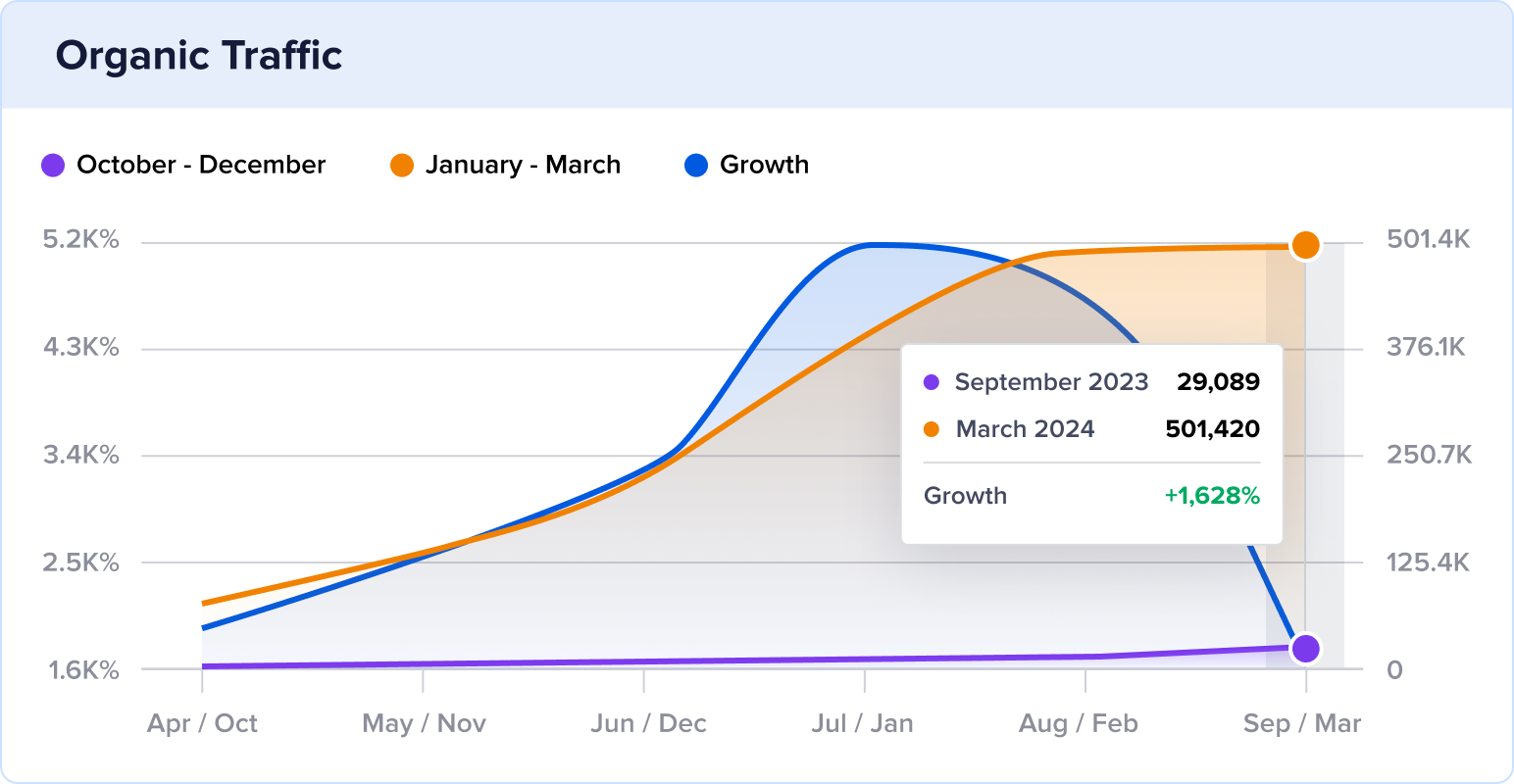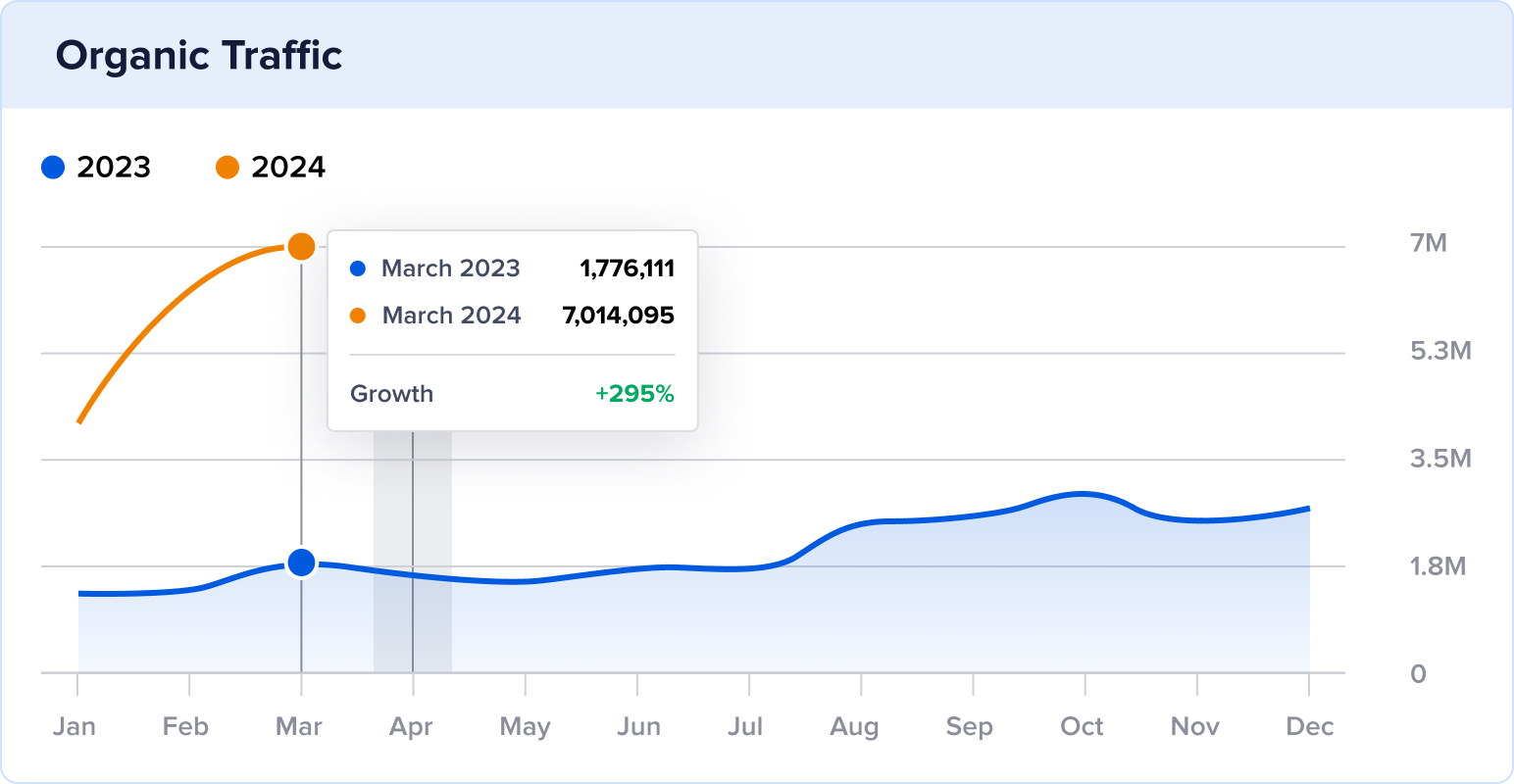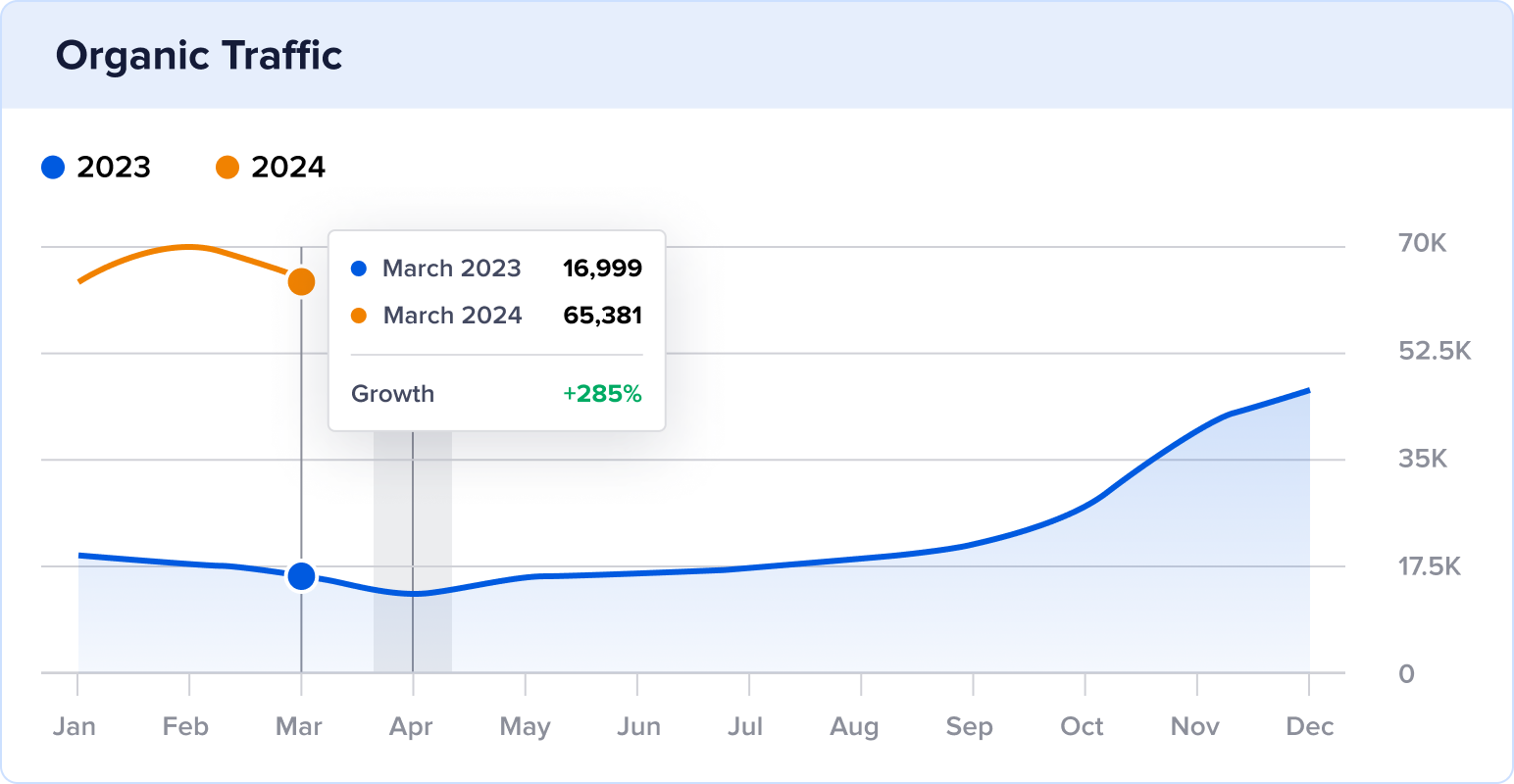How a Sports Betting Glossary Grew Traffic by 1,231% in 3 Months
https://wageringterms.com/
Stats
3.2K to 42.1K Monthly Visits
Industry
Sports & Entertainment
Niche
Sports Betting
Reporting Date
November 2023
Have you ever thought about adding a glossary to your website?
Glossaries can be a smart and easy way to rank for industry keywords and establish E-E-A-T in your niche.
In this SEO case study, we’ll look at how one website transformed this concept into its core purpose.
Meet wageringterms.com, a sports betting glossary.
They’ve exploded organic traffic by 1,231% in just 3 months, and we’re telling you exactly how they did it. (Plus, giving you the how-to tutorials and tools for your WordPress site.)
Let’s begin.
In This Article
About Wagering Terms
Wagering Terms is an online glossary for sports betting terminology.
The site is simple and straightforward.
After landing on the homepage, users can search for a term or sort by letter.

You can also scroll down to see the full list of terms and links to popular words and phrases.
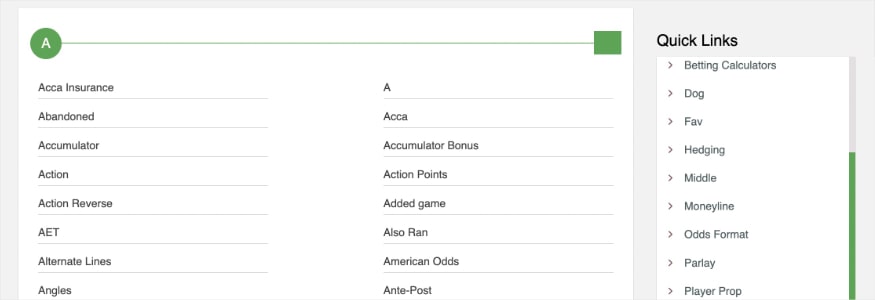
As for the definitions themselves, we’ll discuss their format shortly.
For now, let’s look at how the site has performed since its debut.
Historical Performance
Wagering Terms first appeared online in February 2021. It ended the year with a modest 937 organic visits.
In 2022, this number grew to 12,582.
Now, as we report on 2023 through November, Wagering Terms has reached 91,525 visits.
That’s almost 100 times more than its debut year.
The chart below demonstrates this impressive growth, particularly in the last few months.
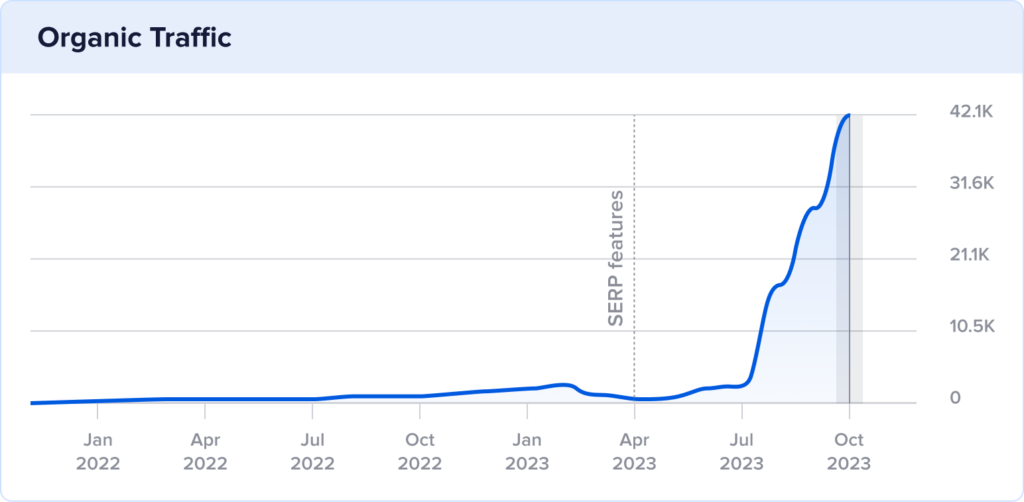
So, what are they doing differently this year to reach these new record highs?
Let’s find out.
The Catalyst: How Wagering Terms Achieved 1,231% Organic Growth in 3 Months
Wageringterms.com grew its organic traffic by performing the following:
- Building out content that fulfills search intent
- Optimizing for People Also Ask
- Implementing video schema
- Gaining more backlinks
Let’s see how these strategies worked for Wagering Terms and how they can work for you, too.
1. Building Out Content That Fulfills Search Intent
Wagering Terms took a slow and steady approach for the first 2 years of its content strategy.
On average, they published 14 new pages per month. There were 100-200 URLs live on the site during this time.
Then, at the beginning of 2023, Wagering Terms turned up its content creation.
In May, they surpassed the 300-URL mark. Then, they doubled it in February.
But it was fall 2023 that really kicked things into high gear.
The chart below reveals a rapid addition of new pages—and the traffic to go with it.
| Month | May | Jun | Jul | Aug | Sep | Oct | Nov |
|---|---|---|---|---|---|---|---|
| Pages on the Site | 735 | 753 | 894 | 1,044 | 1,443 | 1,918 | 2,236 |
| Worldwide Traffic | 1,042 | 1,193 | 2,422 | 3,167 | 17,426 | 28,602 | 42,145 |
Unsurprisingly, the more content you have, the more opportunities you have to rank. (And grow your traffic when the content is up to par.)
For Wagering Terms, the strategy was simple: build out its glossary with new terms.
Each page showcases a definition and related terms. Sometimes, they’ll also feature additional information and/or a video with an audio recording of the definition.
The example below features all these elements.
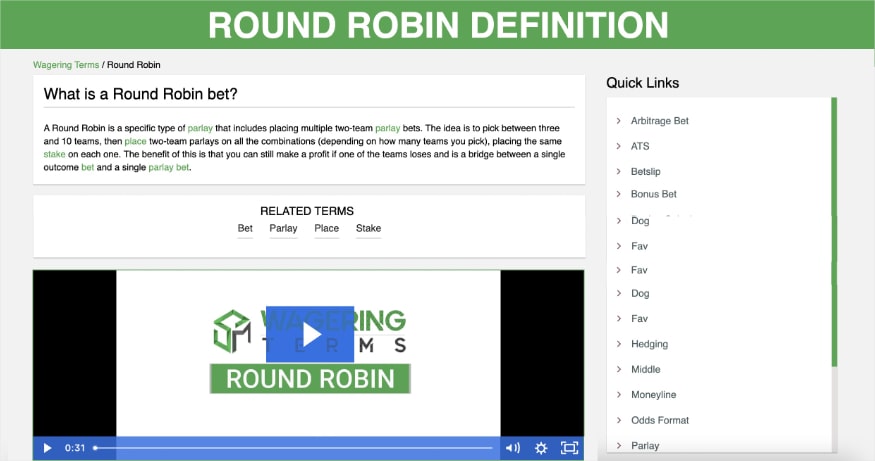
Wagering Terms isn’t reinventing the wheel with its content, but they don’t need to.
These pages align perfectly with the search intent behind their target keywords.
Users want a clear explanation of a specific betting term, and Wagering Terms’ glossary entries give it to them.
Why this matters:
Fulfilling search intent should be at the core of every content piece and strategy. By understanding what your audience is looking for, you can tailor your efforts and content to their needs.
In the case of Wagering Terms, they’re addressing a simple need with a simple answer.
As for how they found these new content opportunities (meaning which new terms to target), that’s the power of keyword research.
Keyword research tells you exactly what your audience is looking for.
And the terms they use in search engines to find it.
Ultimately, keyword research is a critical step in making sure your efforts don’t go to waste. You’ll learn what people are actually searching for and the words to catch their attention.
How to perform keyword research on your site:
This quick-start keyword research guide provides a comprehensive overview of the process.
Here’s a brief recap:
- Learn about your audience.
- Create a list of potential keywords.
- Gather keyword search volumes.
- Analyze related terms and search intent.
We also recommend this beginner’s guide to keyword research. It explains how to find relevant keywords using popular SEO tools like Semrush and Ahrefs.
Tools for keyword research:
Did you know that you can perform keyword research in the WordPress editor?
With the All in One SEO (AIOSEO) plugin, you can connect to your Semrush account and get keyword ideas for your post or page.
Here’s an example of terms it suggested for a polo match blog:
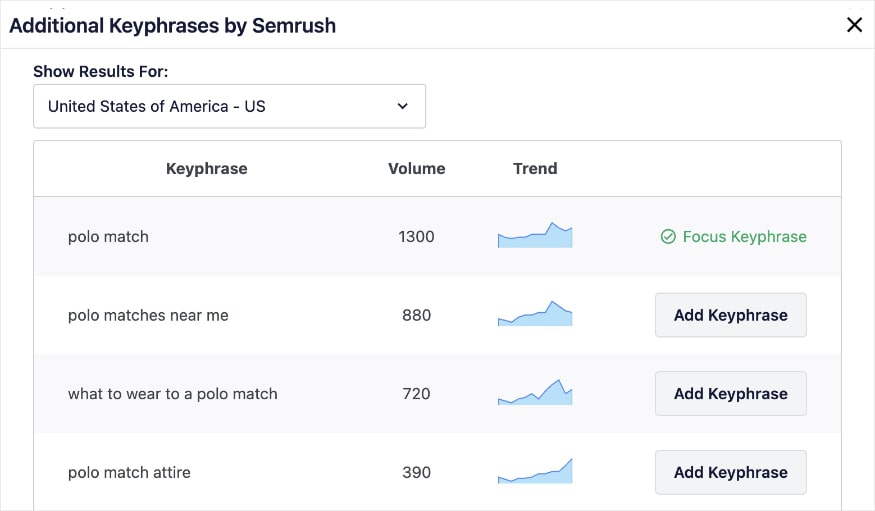
Next, let’s look at how Wagering Terms used smart optimizations to get their definitions on the SERP.
2. Optimizing for People Also Ask
Google’s People Also Ask (PAA) box is a feature that displays relevant questions to the user’s original search query.
It appears near the top of the SERP and uses an accordion layout to reveal the answer. This is what it looks like in search results:
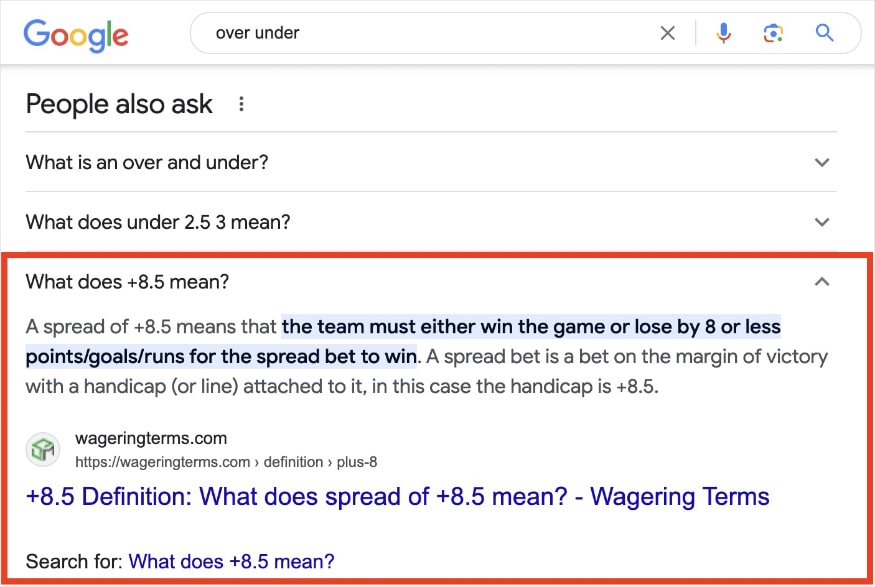
Definitions lend themselves naturally to PAA results, but Wagering Terms is doing a few things to ensure they’re getting seen.
Let’s look at the above definition on the Wagering Terms website to visualize these optimizations.

- They use a question-based subheading. (What does a spread of +8.5 mean?)
- The answer is concise and appears directly below the question and is concise. (A spread of +8.5 means…)
- They implement DefinedTerm schema. (See screenshot below.)
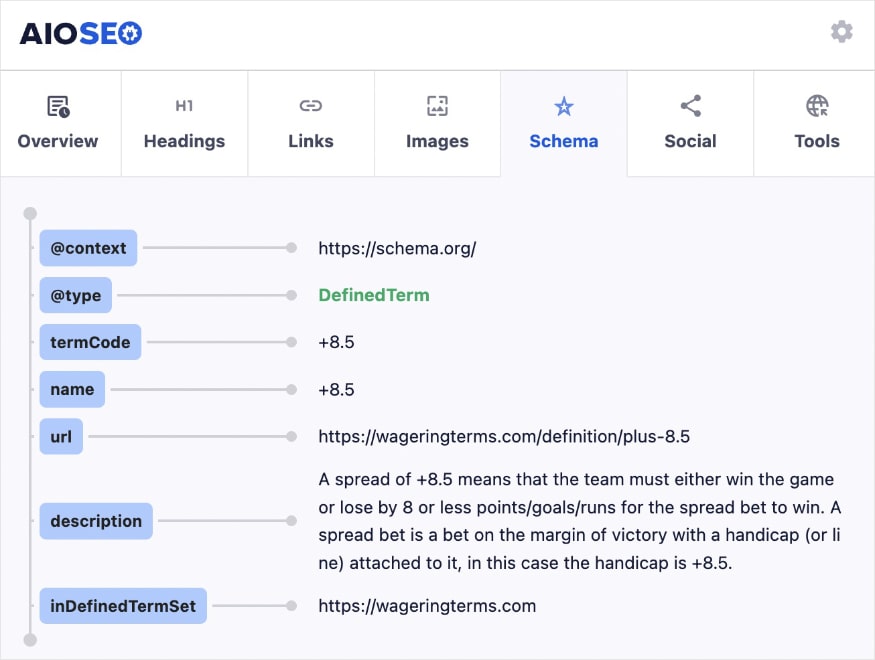
Note: We obtained the above screenshot with the AIOSEO Analyzer. This free Chrome Extension lets you perform quick and easy competitor analyses directly in the browser.
Why this matters:
PAA results bring a range of benefits, including:
- Higher clickthrough rates (CTR)
- Increased organic traffic
- Greater niche authority
- Better visibility
For Wagering Terms, PAA results have been a powerful driver of new rankings. They ranked for 1.7K keywords in Google’s PAA box in November.
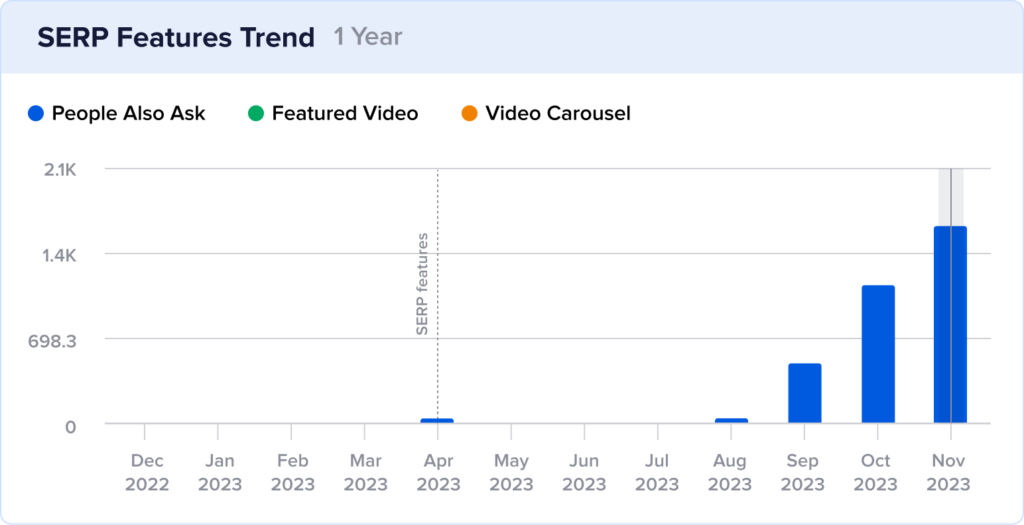
How to optimize for the PAA box on your site:
To obtain these rich results, your content needs to be up to par. High-quality content should always remain the focus of your optimization efforts.
Here are some ways to guide your content creation process to win PAA results:
- Perform keyword research for question-based queries.
- Craft content that fulfils search intent.
- Add FAQ schema. (This could be DefinedTerm schema if you have definition or glossary entries, like Wagering Terms.)
- Conduct a competitor analysis.
For a thorough explanation of each step, this guide tells you exactly how to optimize for Google’s PAA box.
Tools for PAA results:
You already learned how to perform keyword research and analyze search intent in the previous how-to, so let’s focus on schema markup tools.
AIOSEO’s Schema Generator makes adding FAQ or custom schema easy. All you have to do is browse the Schema Catalog and pick the one you want.
Here are just some of the schema types available, including FAQ.

We’re not quite done with schema markup yet. Let’s dive into it in more detail next.
3. Implementing Video Schema
Wagering Terms also implements video schema on its site.
The purpose of schema markup is to help search engines understand and categorize your content.
So, video schema gives it context for the video. Whereas the earlier DefinedTerm schema tells search engines you’re defining a term. Pretty self-explanatory.
Here’s the thing though: schema markup is even more important for multimedia (and it’s important for all content types.)
That’s because search engines can’t watch and understand a video like you and me. Nor can it assess an image’s content without a written explanation.
That’s why you need to leverage text for it (this is one component of video SEO.) This means using elements like video/image schema, alt text, titles, descriptions, etc.
Wagering Terms doesn’t have images, but they do feature embedded videos. And when they do, they include video schema.
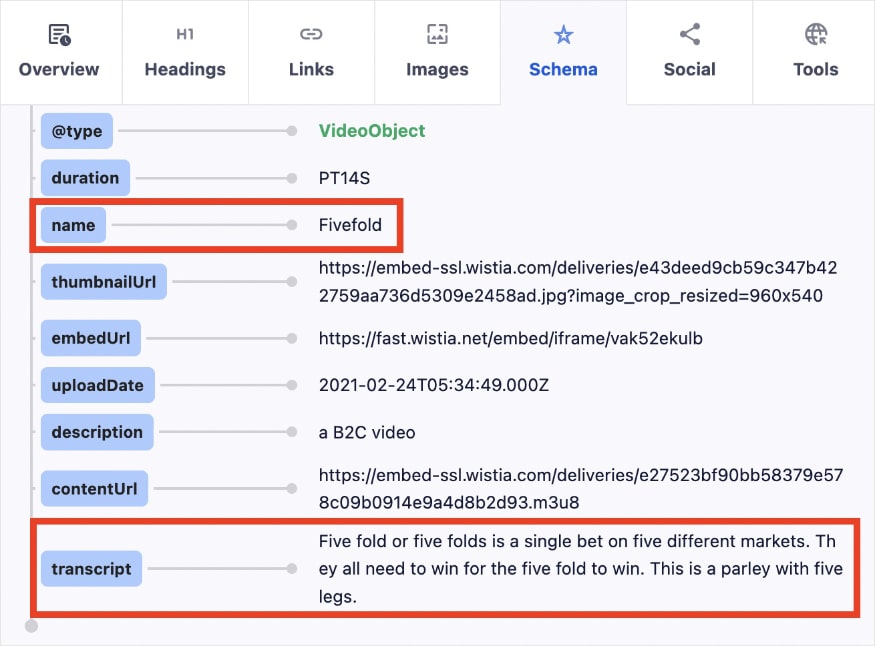
The above screenshot shows how Wagering Terms leverages text to communicate the video’s purpose and content to search engines.
There are also additional signals like the page’s title and subheadings that we looked at earlier.
Why this matters:
If crawlers can’t understand your multimedia, search engines can’t rank it.
And with 91% of businesses using video as a marketing tool, it’s critical to be on top of your game to compete.
Video SEO helps you overcome this and rank in Google’s video search, as demonstrated by Wagering Terms below.
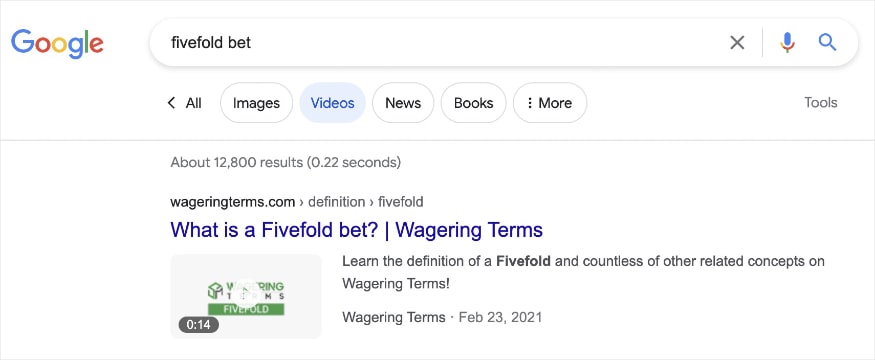
Video schema and SEO can also help you win video rich results in traditional search.
How to implement video schema on your site:
Schema markup lives in the backend of your website. This means you’ll need to get into your site’s code.
There are a few ways to implement video schema on your site manually.
Each method requires you to obtain and copy code snippets into the appropriate fields.
Here is a tutorial for adding schema markup to WordPress without a plugin.
Tools for video schema:
Like the earlier FAQ schema, you can also implement video schema with a click of a button.

Note: If you want to add a transcript to your video, you’ll need to create custom schema. You can then upload this easily into the Schema Generator, as shown below.

Now, we’ll look at the final contributing factor to the growth of Wagering Terms: backlinks.
4. Acquiring More Backlinks
In its first 2 years, Wagering Terms had under 700 backlinks in any given month.
May 2023 marked the beginning of growth, with November reaching 68.3K backlinks.
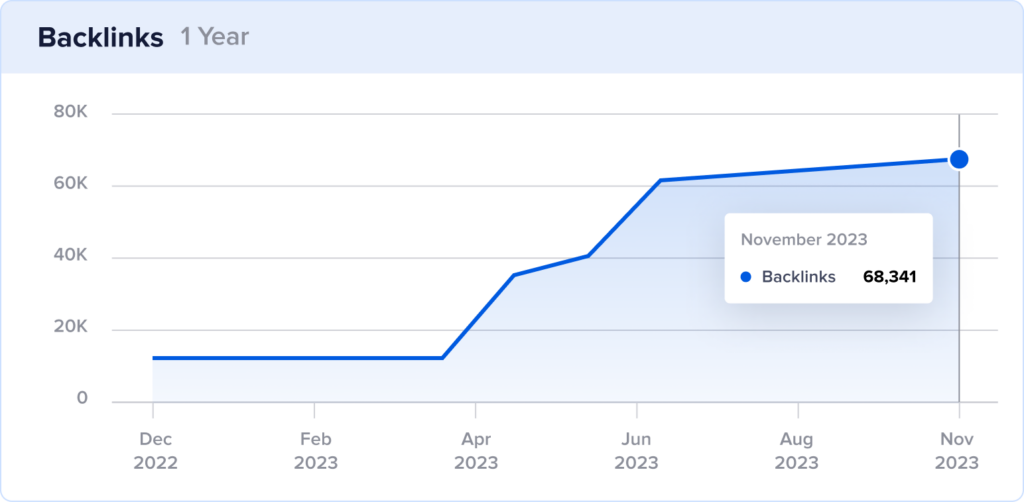
While we can’t speak to the exact strategies used to obtain these backlinks, it’s important to recognize it as a contributor to the growth of Wagering Terms.
Why this matters:
Backlinks are like votes of confidence for your site.
They signal to search engines that your content is trustworthy, and they can help build authority in your niche.
They’re also among the top two Google ranking factors.
How to do link building for your site:
There’s no denying the power of backlinks when growing your website’s visibility (and this backlinking guide shows you how to get them.)
However, a strong linking strategy goes beyond backlinks. You’ll need to take a holistic approach and also optimize for the following:
- Internal links (from one page on your site to another page on your site)
- Outbound links (from your site to another external site)
This link-building guide shows you how to optimize for each.
Tools for link building:
Link Assistant can help you find internal linking opportunities quickly. With linking suggestions provided in the WordPress editor, it’s as simple as clicking Add Link.
The screenshot below shows how it gives you inbound internal suggestions (other pages on your site that could link to the page/post you’re working on.)
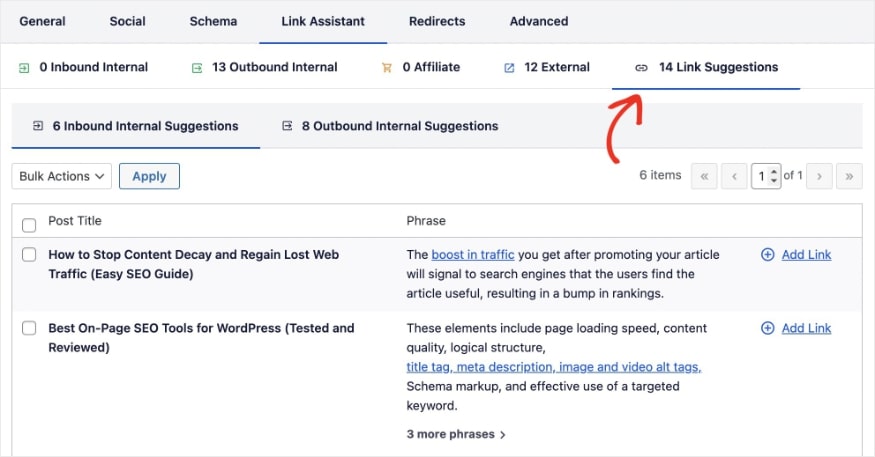
Standout SEO Wins
Before we wrap up, there’s an additional SEO technique worth highlighting at wageringterms.com:
1. They have a strong internal linking strategy.
Speaking of links, Wagering Terms uses a simple yet effective internal linking strategy on its website. Every glossary entry includes related terms and quick links.
They also link within the copy itself, distinguishing hyperlinks in green.
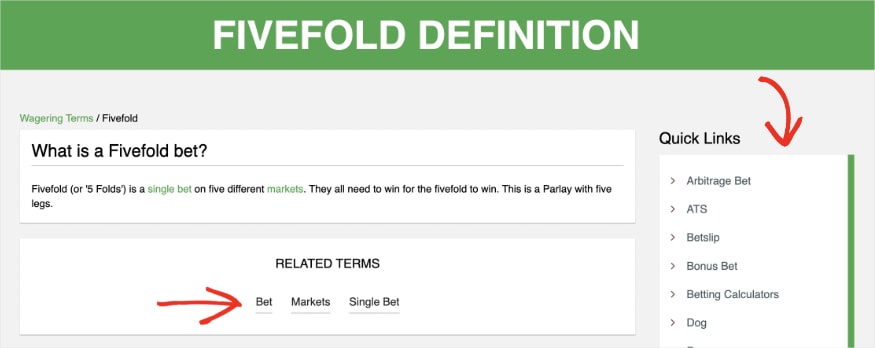
Finally, they display breadcrumbs to aid user navigation and support internal linking efforts.
Breadcrumbs represent the hierarchy of a page within your site’s URL structure. In the above screenshot, the breadcrumbs are “Wagering Terms / Fivefold” just above the subheading.
Tool: Turning on breadcrumbs is as simple as the flip of a switch. You can also customize the settings to change how they’re displayed.
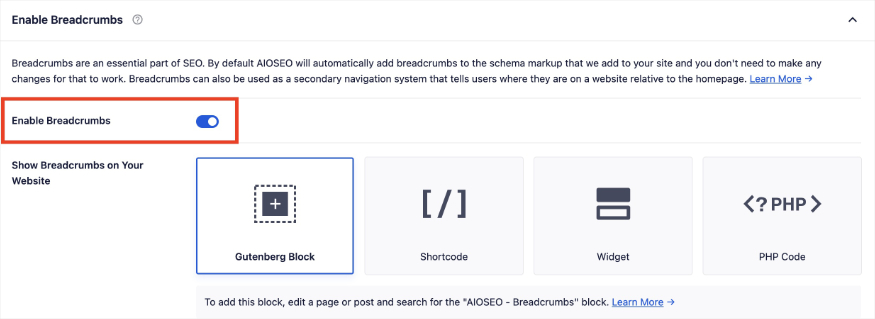
As for internal linking, Link Assistant can help you find related content while working in the WordPress editor. It will suggest relevant posts or pages and show you where it fits into your content.
The example below shows outbound internal suggestions, which link from your current post/page to another page on your site.
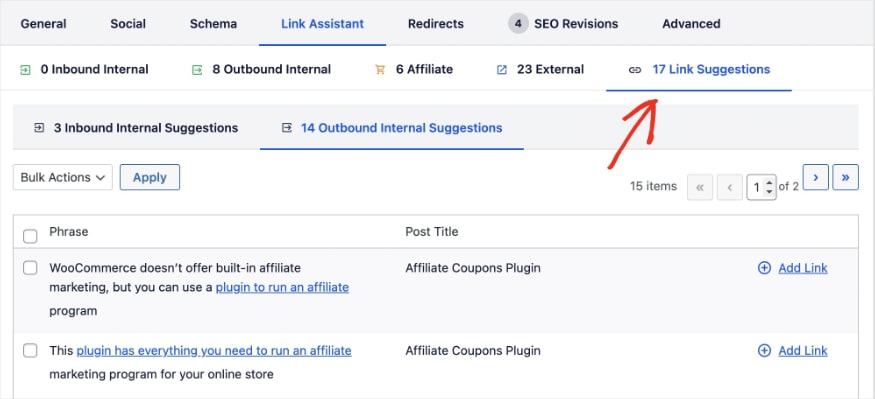
Takeaways
In our analysis of wageringterms.com, we’ve learned that a simple concept can take off when done right.
They’re an excellent example of foundational SEO best practices and show off the utility of a glossary on your site.
Now, let’s review their best strategies and which ones to reconsider.
Top 3 Strategies to Emulate
- Grow your content portfolio. Expanding your content portfolio is a key strategy for increasing online visibility. Regularly publishing content attracts a broader audience and provides more ranking opportunities. This ultimately can drive more traffic to your site.
- Understand and fulfill search intent. It’s not just about the number of pages on your site. You also need to deliver high-quality content. This process starts by knowing what your audience wants. When you analyze and understand search intent, you can tailor your content to their needs.
- Implement schema markup. Schema markup is a powerful way to win rich results on the SERP. And while it’s not guaranteed, it certainly increases your chances. It’s also not difficult to implement when you have the right tools, like the AIOSEO Rich Snippet Schema.
Bottom 3 Strategies to Reconsider
- No social media presence. Wagering Terms could enhance its reach through social media. It could be as simple as posting a term of the day. Ultimately, absence from social media limits your content’s reach and audience engagement. AIOSEO helps you connect with your audience through our social media integration. Add your favorite platforms and customize how the thumbnails look when posted online.
- No automatic redirects for 404 errors. Page not found errors can lead to a poor user experience and negatively impact SEO. Instead, set up automatic redirects to ensure users and bots have a seamless navigation experience. Redirection Manager makes this easy, so you can guarantee your users are going where you want them to.
- They don’t appear to have an RSS sitemap. An RSS sitemap ensures search engines promptly discover and index your content. And when you’re putting out as much content as Wagering Terms, the faster it’s indexed, the quicker it can rank. AISOEO generates RSS sitemaps for you automatically so that you can see results ASAP.
Steal Our SEO Winning Strategy: A Checklist for Your Website
Are you ready to capture more clicks and win your audience’s attention?
Our exclusive SEO Checklist has the steps you need to reach the top of the SERP.
Download A Free SEO Checklist
Access our comprehensive SEO Checklist with a single click. We’ll deliver it straight to you, putting actionable items with SEO tools and tutorials right at your fingertips.
Enter your name and email to download a free SEO checklist.
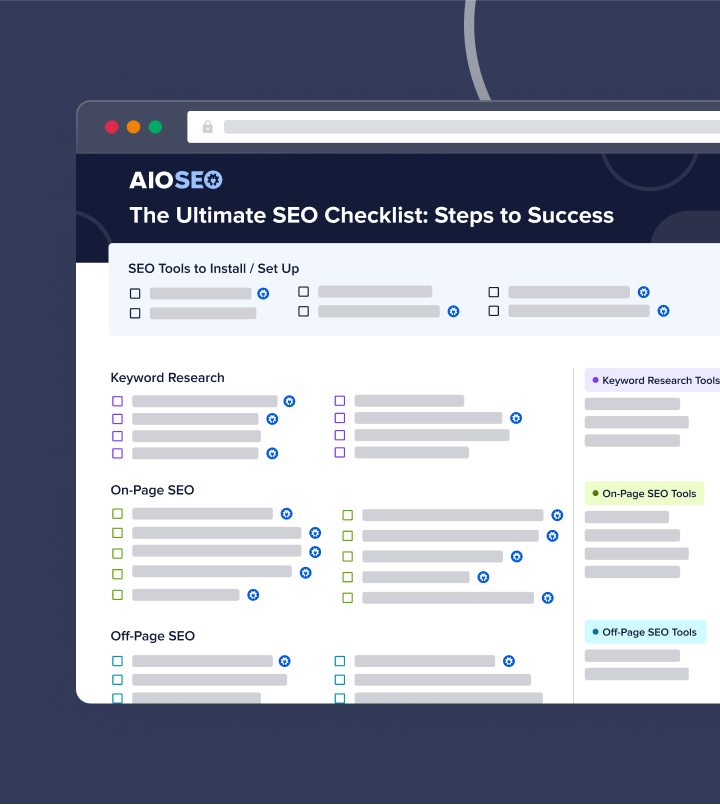
Unlock Higher Rankings and More Traffic With AIOSEO
You don’t have to implement a winning SEO strategy on your own. AIOSEO is here to support your efforts with tools that make optimizations easy.

Trusted by over 3 million website owners and with thousands of 5-star reviews, AIOSEO has everything you need to grow your WordPress site’s visibility. You’ll have a suite of powerful tools at your fingertips, ready to help you take your SEO and traffic to the next level.
Here are some of our favorite features:
- Semrush Keyphrase Suggestions: Find new keywords without having to leave WordPress. AIOSEO pulls keyphrase suggestions from Semrush and serves them to you directly in the WordPress editor.
- Schema Generator: AIOSEO offers various schema types to help you claim more real estate on the SERP with rich results. It’s as simple as choosing the schema you want; then, we’ll take care of the rest.
- Video SEO Sitemaps: Let search engines know when you publish a new video on your site with video SEO sitemaps. AIOSEO generates these for you automatically so your videos can rank faster in search results.
- Link Assistant: Apply internal linking best practices with easy linking suggestions and reports. These tools help you boost content discovery and prevent orphan pages.
- Breadcrumbs: Create a trail for users and search engines to understand where they are in your site hierarchy. Breadcrumbs are a great way of facilitating navigation.
- Social Media Integration: Connect and share content across your favorite social media platforms. Choose from Facebook, Instagram, Twitter, LinkedIn, Pinterest, and more.
- Redirection Manager: Create a seamless user navigation experience that prevents humans and bots from getting lost when you move content. Our Redirection Manager helps you easily choose and implement the best redirect type.

